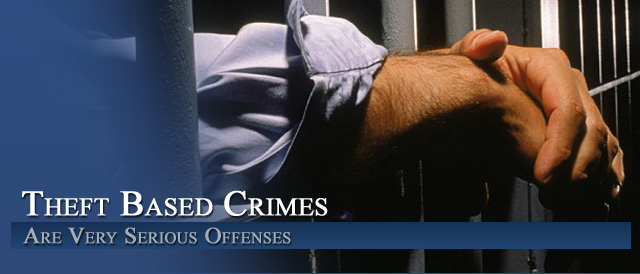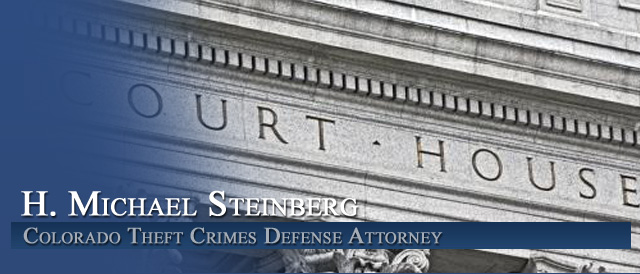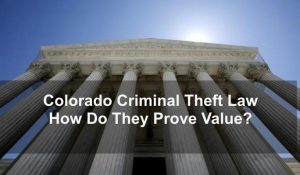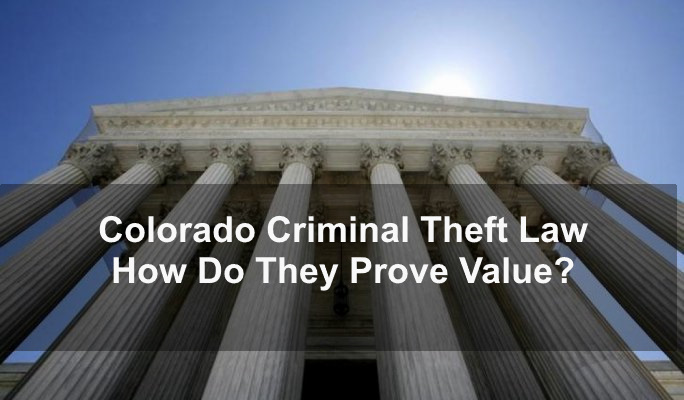




Colorado Criminal Theft Law – How Do They Prove Value?
By H. Michael Steinberg Colorado Theft Crimes Criminal Defense Lawyer – Attorney
Colorado Criminal Theft Law – How Do They Prove Value? One of the ways to fight a Colorado Theft charge that is filed as a felony – is to challenge the District Attorney’s method of proving the total value of the items alleged to have been stolen.
This article discusses the law that applies to Colorado Theft Trials. To understand this area – you must first start with the Colorado statute that provides the basis for the admission of “value” evidence in the theft crimes trial. That law is Colorado Revised Statute 18-4-414:
§ 18-4-414. Evidence of Value
(1) For purposes of this part 4, when theft occurs from a store, evidence of the retail value of the thing involved shall be prima facie evidence of the value of the thing involved.
Evidence offered to prove retail value may include, but shall not be limited to, affixed labels and tags, signs, shelf tags, and notices.
(2) For the purposes of this part 4, in all cases where theft occurs, evidence of the value of the thing involved may be established through the sale price of other similar property and may include, but shall not be limited to, testimony regarding affixed labels and tags, signs, shelf tags, and notices tending to indicate the price of the thing involved.
Hearsay evidence shall not be excluded in determining the value of the thing involved.
The Classic Fact Pattern For Colorado Theft Crimes Involving 18-4-414 – A Shoplifting Case
The classic fact pattern in a Colorado shoplifting – theft case is as follows:
A store security guard spots a suspect taking items from store racks and putting them into store labeled bags. The suspect then leaves the store without paying for thee items and is apprehended. In compiling the final report, the security guard and the police officer total the items using each items’ price tags which – when totaled – exceed the threshold that separates a Colorado misdemeanor crime from a felony crime.
The total alleged value of the items taken in a Colorado Theft Crime Case is critically important. Here are the reasons why.
Under Colorado law a charge for the crime of theft is a felony or a misdemeanor depending upon the value of the item or items taken, Section 18-4-401(2), C.R.S. requires that the State prove the value of the stolen items beyond a reasonable doubt.
In Colorado – Theft is:
A Class 1 Petty Offense
If the Value of the Thing Involved Is less than Fifty Dollars;
A Class 3 Misdemeanor
If the Value of the Thing Involved Is Fifty Dollars or More but less than Three Hundred Dollars;
A Class 2 Misdemeanor
If the Value of the Thing Involved Is Three Hundred Dollars or More but less than Seven Hundred Fifty Dollars;
A Class 1 Misdemeanor
If the Value of the Thing Involved Is Seven Hundred Fifty Dollars or More but less than Two Thousand Dollars;
A Class 6 Felony
If the Value of the Thing Involved Is Two Thousand Dollars or More but less than Five Thousand Dollars;
A Class 5 Felony
If the Value of the Thing Involved Is Five Thousand Dollars or More but less than Twenty Thousand Dollars;
A Class 4 Felony
If the Value of the Thing Involved Is Twenty Thousand Dollars or More but less than One Hundred Thousand Dollars;
A Class 3 Felony
If the Value of the Thing Involved Is One Hundred Thousand Dollars or More but less than One Million Dollars; and
A Class 2 Felony
If the Value of the Thing Involved Is One Million Dollars or More
The case then goes to trial on the felony charge and the Defendant challenges the value of the items taken during the trial..
The Purpose Of The Law – The Meaning Of Value
When the Colorado general assembly enacts a law that states that a price tag attached to an item for sale is proof that is “sufficiently trustworthy” to speak for itself as regards that item’s value. This is called a legal presumption.
The Colorado rules of evidence are formulated to reflect real life and Section 18-4-414 was enacted to reflect the fact that, because in our society does not normally bargain, the price tag on an item is therefore presumptively the means by which sellers designate an item’s retail value.
For example, the Kelley blue book may be admitted in a trial as proof of value and there is no need for expert testimony to further substantiate the blue book’s valuation methods.
But this same law ALSO allows the accused the right to rebut that legal presumption of value by calling, for example a store manager or an expert who can establish a value other than that specified on the price tag.
Thus if the Blue Book provides an alternative valuation for the sale price of similar property as that advanced during a trial, that valuation is admissible over the objection of the prosecutor.
Defending A Charge Of Theft Based On Challenging Valuation
While the price tag is considered prima facie (based on first impression – accepted as correct until proved otherwise – minimally persuasive evidence) it is not necessarily legally conclusive of an item’s value. The law also recognizes that there are exceptions where the price tag might not reflect true value.
There are times when a retail item is mis-marked or the item might be the type – such as an automobile – where the price is the subject of negotiation. If the Defendant can locate and retain an expert who can rebut the presumption of value – the law provides for the opportunity to establish a value other than that specified on the price tag.
Put differently, a Colorado Defendant has the right to present direct evidence that the price tags totaled by the police do not necessarily reflect the market value of the goods allegedly stolen.
But remember – if the Defendant makes this argument at trial – the Defendant must present evidence to support that contention. If a Defendant makes the claim but fails to introduce the evidence on the issue of valuation – it defeats the claim.
Good Luck
Colorado Criminal Theft Law – How Do They Prove Value?
If you found any of the information I have provided on this web page article helpful please click my Plus+1 or the Share buttons for Twitter and Facebook below so that others may also find it.
The reader is admonished that Colorado criminal law, like criminal law in every state and at the Federal level, changes constantly. The article appearing above was accurate at the time it was drafted but it cannot account for changes occurring after it was uploaded.
If, after reading this article, you have questions about your case and would like to consider retaining our law firm, we invite you to contact us at the Steinberg Colorado Criminal Defense Law Firm – 303-627-7777.
Never stop fighting – never stop believing in yourself and your right to due process of law. You will not be alone in court, H. Michael will be at your side every step of the way – advocating for justice and the best possible result in your case. H. Michael Steinberg is passionate about criminal defense. His extensive knowledge and experience of Colorado Criminal Law gives him the edge you need to properly handle your case
 ABOUT THE AUTHOR: H. Michael Steinberg – Email The Author at:
ABOUT THE AUTHOR: H. Michael Steinberg – Email The Author at:
A Denver Colorado Criminal Defense Lawyer – or call his office at 303-627-7777 during business hours – or call his cell if you cannot wait and need his immediate assistance – please call 720-220-2277.
“A good criminal defense lawyer is someone who devotes themselves to their client’s case from beginning to end, always realizing that this case is the most important thing in that client’s life.”
You should be careful to make a responsible choice in selecting a Colorado Criminal Defense Lawyer. We encourage you to “vet” our firm. Over the last 35 plus years – by focusing ONLY on Colorado criminal law – H. Michael has had the necessary time to commit to the task of constantly updating himself on nearly every area of criminal law, to include Colorado criminal law and procedure and trial and courtroom practice.
Putting more than 40 years of Colorado criminal defense experience to work for you.
H. Michael works hard to get his clients the best possible results in and out of the courtroom. He has written, and continues to write, extensively on Colorado criminal law and he hopes this article helps you in some small way – Colorado Criminal Theft Law – How Do They Prove Value?

Other Articles of Interest:
- Colorado Theft Crimes – How Can The State Prove The Value Of What Was Stolen? Evidence Of Value 18-4-414
- Understanding The Colorado Identity Theft Law |18-5-902
- Obtaining Control Over Any Stolen Thing of Value 18-4-404 and Theft By Receiving Stolen Property
- Colorado Criminal Theft Law – A Civil Suit For Theft 18-4-405- Treble Damages – The Other Shoe Drops
- Colorado Theft Crimes – Questions and Answers About Colorado’s Money Laundering Laws – 18-5-309












